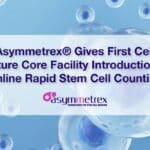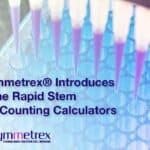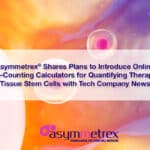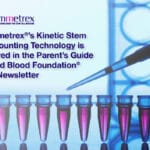USPTO Issues Patent to Asymmetrex for Technologies for Counting Adult Tissue Stem Cells for the First Time
Today, July 14, the U.S. Patent and Trade Office is scheduled to issue a patent to Asymmetrex, LLC for the stem cell biotechnology company’s new biomarkers that have sufficient specificity to allow adult stem cell counting for the first time. The timing of the USPTO announcement fits well with the company’s current 1 year crowdsourcing campaign designed to engage academic scientists, biotechnologists, tissue bioengineers, and regenerative medicine physicians world-wide in the evaluation of the full range of tissue stem cell counting applications of its lead biomarker called “H2A.Z asymmetry.”
Boston, MA (PRWEB) July 14, 2015
Everyone understands the importance of knowing the dose of medicines. The dose is the amount of a medicine that a patient receives. Not only is the number of pills or the volume taken known, but also the exact amount of the active ingredients in the pills or the liquid medicine, respectively, is known to microgram or microliter accuracy. The same is true of cell medicines like the number of red blood cells or platelets received in blood transfusions. This is where adult stem cell counting comes into play.
But this longstanding principle of knowing dose in medical care, which is used universally to achieve effective and safe treatments, is nowhere to be found in regenerative medicine based on adult tissue stem cell transplantation. No matter whether the treatments are approved (as in the case of cord blood and bone marrow transplant therapies) or experimental (as in the case of hundreds of active regenerative medicine clinical trials), the number of tissue stem cells supplied to patients is unknown. Adult stem cell counting provides a solution for this surprising blind spot in regenerative medicine practice and could improve the quality of approved stem cell treatments and greatly accelerate progress in developing new ones.
Prior to founding Asymmetrex in 2013, the company’s director, James Sherley, led teams of scientists at Fox Chase Cancer Center, Massachusetts Institute of Technology, and Boston Biomedical Research Institute in research to discover a means to count adult tissue stem cells. Sherley recounts, “We knew that other labs had pretty much exhausted approaches based on isolating highly purified preparations of tissue stem cells for the purpose of looking for stem cell-specific biomarkers.” Because stem cells exist in very low numbers in tissues and are hard to multiply in culture, purified preparations always contain a much larger number of committed progenitor cells that share many features with tissue stem cells. So, the biomarkers found by purification strategies invariably lacked sufficient specificity to distinguish tissue stem cells from committed progenitor cells, which lack the long-term tissue renewal ability of tissue stem cells.
Instead of attempting to isolate tissue stem cells, Sherley’s teams tried a new strategy of isolating cellular processes that are unique to tissue stem cells. Initially, they did not even use tissue stem cells. Sherley engineered abundant stable cell lines to mimic two cellular processes found exclusively in tissue stem cells. By using this strategy the problem of contaminating, confounding stem-like committed progenitor cells was avoided altogether.
Though several members of the new class of biomarkers identified by Sherley’s teams had a greater specific expression in tissue stem cells than earlier biomarkers, initially none seemed to rise to the level of specificity needed for adult stem cell counting. But this first impression was quickly turned on its head with further investigation. Many of the new biomarkers display a “pattern-specific” property that manifests two cellular processes that are exclusive to adult tissue stem cells. These are asymmetric self-renewal and non-random chromosome segregation.
Asymmetric self-renewal is the process by which tissue stem cells are able to renew tissues without losing their stem cell identity; and non-random chromosome segregation is a unique process by which tissue stem cells retain chromosomes with the oldest DNA molecules, which are called immortal DNA strands. Many of the newly patented biomarkers are detected in stem cells before and after they divide asymmetrically to renew themselves while simultaneously producing a committed progenitor cell. But these biomarkers are not detected in the new committed progenitor cell.
The most exciting new biomarkers covered in Asymmetrex’s new patent associate specifically with the immortal strands in asymmetrically self-renewing tissue stem cells. One of them is a DNA coating protein called H2A.Z. Although a widely expressed cell factor, in asymmetrically self-renewing tissue stem cells H2A.Z is only detectable on chromosomes that contain immortal DNA strands. This property gives H2A.Z an asymmetric pattern of detection in tissue stem cells, whereas it appears uniform in other cell types or is undetectable as in new committed progenitor cells.
As a strategy to rapidly evaluate the predicted wide range of applications for the new biomarkers in different organs and tissues of different mammalian species, and human tissues in particular, on April 29, Asymmetrex launched acrowdsourcing campaign to invite investigators worldwide to participate in evaluation of the company’s lead biomarker for counting tissue stem cells, H2A.Z asymmetry. Sherley anticipates that news of the issuance of the new patent (US9081008) for counting adult tissue stem cells will further galvanize this unique community effort. For its crowdsourcing campaign, Asymmetrex was recently recognized as an “Industry Innovator” on the blog post of the Massachusetts Biotechnology Council. The company plans to present an update on progress with the crowdsourcing campaign at the 8th International Epigenetics, Stem Cells, Sequencing & SNiPs-2015 Meeting from August 24-25 in Boston.
Asymmetrex, LLC is a Massachusetts life sciences company with a focus on developing technologies to advance stem cell medicine by way of adult stem cell counting. Asymmetrex’s founder and director, James L. Sherley, M.D., Ph.D. is an internationally recognized expert on the unique properties of adult tissue stem cells. The company’s patent portfolio contains biotechnologies that solve the two main technical problems – production and quantification – that have stood in the way of successful commercialization of human adult tissue stem cells for regenerative medicine and drug development. In addition, the portfolio includes novel technologies for isolating cancer stem cells and producing induced pluripotent stem cells for disease research purposes. Currently, Asymmetrex’s focus is employing its technological advantages to develop facile methods for monitoring adult stem cell number and function in clinically important human tissues.







Leave a Reply